
Pane, Amore e Condizionale: Una Ricetta per la Felicità!
Learning to Love the Italian Conditional Tense
Perché Usare il Tempo Condizionale Italiano?
Why Use the Italian Conditional Tense?
Il tempo condizionale, o condizionale, è fondamentale per esprimere cortesia, fare dichiarazioni ipotetiche e immaginare scenari “cosa succederebbe se.” Che tu stia sognando possibilità future, dando consigli o creando una storia emozionante, il condizionale ti permette di comunicare con eleganza e creatività. Padroneggiarlo aggiunge profondità al tuo italiano, rendendo le conversazioni più coinvolgenti e autentiche!
The Italian conditional tense, or condizionale, is essential for expressing politeness, making hypothetical statements, and imagining “what if” scenarios. Whether you’re dreaming about future possibilities, giving advice, or crafting a heartfelt story, the conditional tense allows you to communicate with finesse and creativity. Mastering it adds depth to your Italian, making conversations more engaging and authentic!

Il Pane dell’Amore: Una Storia al Condizionale
The Bread of Love: A Conditional Tale
Matteo era il miglior fornaio del villaggio, famoso per il pane più delizioso e i dolci più irresistibili. Tuttavia, un giorno, smise di cucinare. Si diceva che, se Matteo trovasse la ragazza giusta da sposare, tornerebbe felice e ricomincerebbe a preparare le sue prelibatezze.
Matteo was the best baker in the village, famous for the most delicious bread and irresistible cakes. However, one day, he stopped baking. It was said that if Matteo found the right girl to marry, he would be happy again and would start baking his treats once more.
Dall’altra parte del villaggio viveva Giulia, una giovane artista che, come Matteo, era triste e non dipingeva più. Gli abitanti credevano che, se Matteo e Giulia si incontrassero, si innamorerebbero e ritroverebbero entrambi l’ispirazione perduta.
On the other side of the village lived Giulia, a young artist who, like Matteo, was sad and could no longer find the desire to paint. The villagers believed that if Matteo and Giulia were to meet, they would fall in love and both rediscover their lost inspiration.
Un giorno, i due si incontrarono per caso. Se qualcuno avesse visto i loro sguardi, saprebbe subito che era amore a prima vista. Matteo avrebbe ripreso a impastare e Giulia avrebbe iniziato a dipingere di nuovo.
One day, the two met by chance. If anyone had seen their gaze, they would have immediately known it was love at first sight. Matteo would start kneading dough again, and Giulia would begin painting once more.
Presto il villaggio si riempirebbe di profumi di pane appena sfornato e di splendidi dipinti dai colori vivaci. Tutti sarebbero felici, e Matteo e Giulia vivrebbero per sempre circondati da amore, pane e arte.
Soon, the village would be filled with the aroma of freshly baked bread and beautiful, vibrant paintings. Everyone would be happy, and Matteo and Giulia would live happily ever after, surrounded by love, bread, and art.
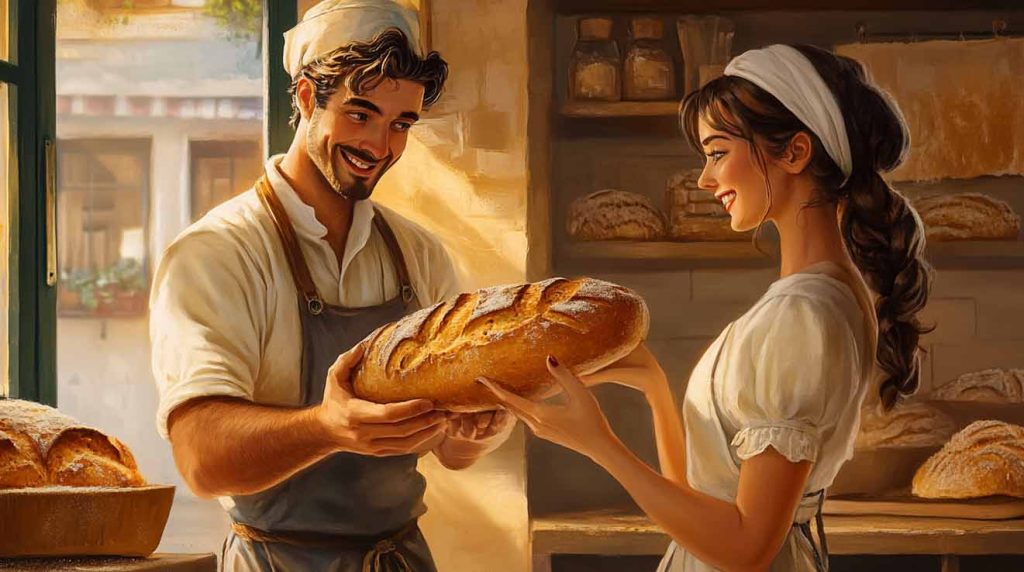
Padroneggiare il Condizionale Italiano: Parla con Stile e Raffinatezza
Mastering the Italian Conditional Tense: Speak with Style and Subtlety
The Italian conditional tense, or condizionale, is a versatile tool that adds elegance to your speech. It’s primarily used to express actions that would happen under specific conditions or to convey politeness and desire. Think of it as the Italian equivalent of “would” plus a verb in English. The condizionale is indispensable in both hypothetical scenarios and polite requests, making your Italian sound refined and thoughtful.
There are two forms of the conditional tense in Italian:
Present Conditional (condizionale presente)
Past Conditional (condizionale passato)
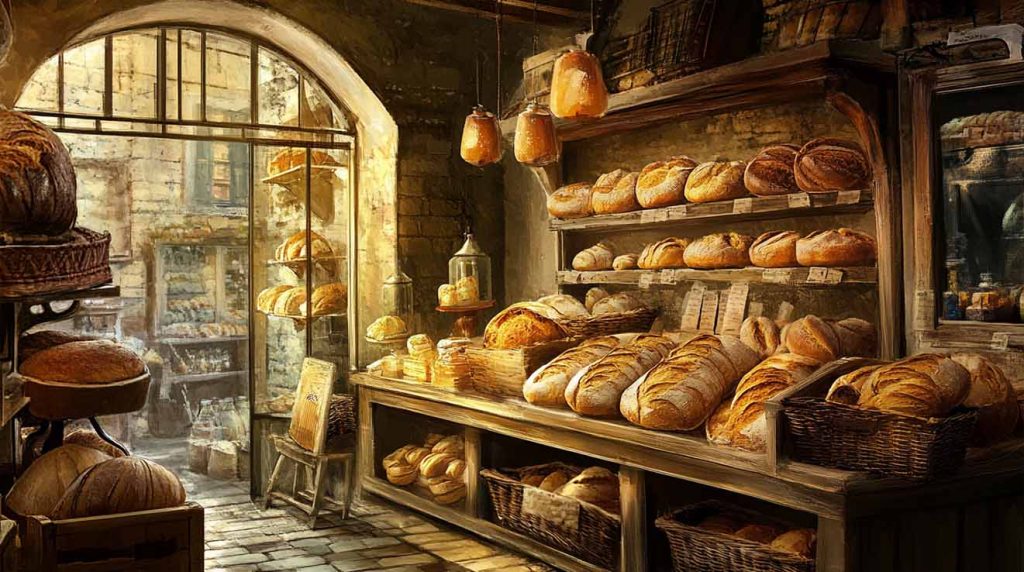
The Condizionale Presente Tense Used in Everyday Italian
Expressing possibilities or hypothetical situations
Vorrei dipingere un quadro.
I would like to paint a picture.
Making polite requests
Potresti aiutarmi?
Could you help me?
Expressing wishes or desires
Vorrei andare in Italia.
I would like to go to Italy.
How to Form the Present Conditional Tense
To form the condizionale presente for regular verbs, simply add the following endings to the stem of the infinitive verb. Note that for -are verbs, the a in the stem changes to e:
-are verbs: -erei, -eresti, -erebbe, -eremmo, -ereste, -erebbero
-ere verbs: -erei, -eresti, -erebbe, -eremmo, -ereste, -erebbero
-ire verbs: -irei, -iresti, -irebbe, -iremmo, -ireste, -irebbero
Parlare (to speak): parleresti (you would speak)
Credere (to believe): crederei (I would believe)
Sentire (to hear): sentiremmo (we would hear)

The Condizionale PAST Tense
The condizionale passato (past conditional) allows you to reflect on hypothetical situations, wishes, or possibilities that could have occurred in the past. This tense is a key to expressing regret, missed opportunities, or unfulfilled desires with nuance and clarity.
When to Use the Past Conditional
To express a hypothetical situation in the past
Avrei mangiato il pane.
I would have eaten the bread.
To reflect on a wish or possibility in the past
Avresti voluto partecipare?
Would you have liked to participate?
How to Form the Past Conditional Tense
The condizionale passato is formed by combining the present conditional of the auxiliary verbs avere or essere with the past participle of the main verb.
Use avere or essere as the auxiliary verb, following the same rules as in other compound tenses (e.g., essere is used for reflexive verbs and verbs of motion or state). When essere is the auxiliary, the past participle must agree in gender and number with the subject:
AVERE
Avrei parlato.
I would have spoken.
ESSERE
Saremmo andati.
We would have gone.
Saremmo andate.
We would have gone.
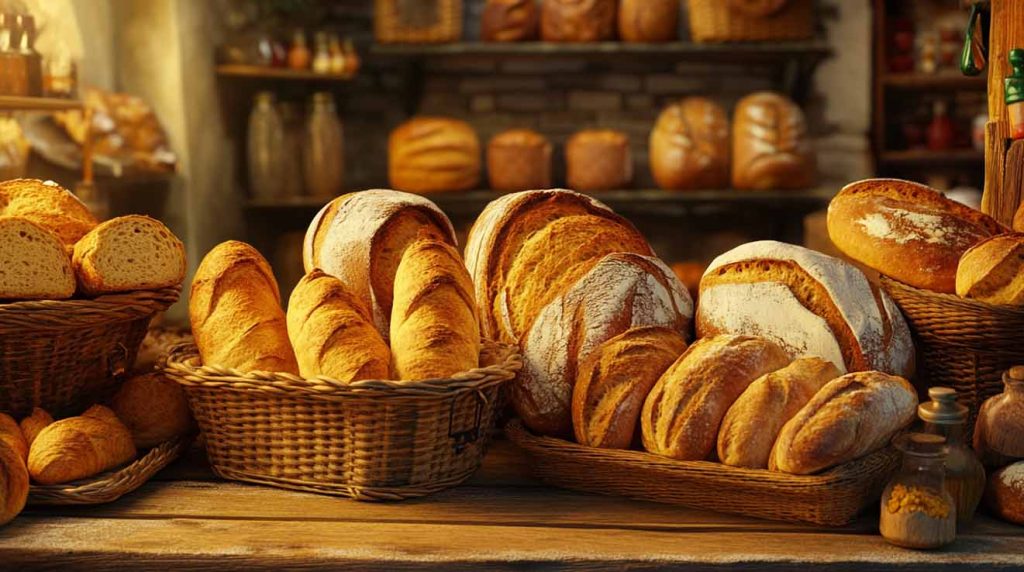
Mastering the Italian Conditional: Practice Makes Perfect
The key to becoming confident with the Italian conditional tense is consistent practice. Regularly forming sentences in both the present and past conditional will help you express hypothetical scenarios, make polite requests, or share wishes and desires with ease.
Expressing Wishes or Desires
Vorrei baciarti.
I would like to kiss you.
Preferiresti andare al cinema o a teatro?
Would you prefer to go to the cinema or the theater?
Amerebbe vivere in campagna.
He/She would love to live in the countryside.
Making Polite Requests
Potresti passarmi il sale, per favore?
Could you pass me the salt, please?
Mi dareste un passaggio fino alla stazione?
Would you give me a ride to the station?
Potremmo avere il menù?
Could we have the menu?
Discussing Hypothetical Scenarios
Imagine “what if” situations with conditional to express possibilities
Andrei al mare se non piovesse.
I would go to the sea if it were not raining.
Se avessi tempo, viaggerei di più.
Would you give me a ride to the station?
Se fosse possibile, comprerebbero una casa più grande.
If it were possible, they would buy a bigger house.
Offering Advice or Suggestions
Dovresti riposarti se ti senti stanco.
You should rest if you feel tired.
Farei attenzione a quello che dici.
I would be careful about what you say.
Se fosse possibile, comprerebbero una casa più grande.
If it were possible, they would buy a bigger house.

Using the Conditional with “If” Clauses in Italian
In Italian, hypothetical phrases using “se” (if) often pair a condition in one clause with the conditional tense in the main clause to express what would happen if the condition were met. These structures are common when discussing unreal, hypothetical, or imagined scenarios.
How It Works
The clause introduced by se typically uses the imperfect subjunctive (congiuntivo imperfetto).
The main clause uses the present conditional (condizionale presente) to indicate the hypothetical outcome.
Examples of Conditional “If” Clauses
Se Matteo si innamorasse davvero,
farebbe il pane migliore e avrebbe poteri magici.
If Matteo truly fell in love,
he would bake the best bread and have magical powers.
Se fosse bel tempo, andremmo al parco.
If it were nice weather, we would go to the park.
Se potessi, viaggerei in tutto il mondo.
If I could, I would travel around the world.
Se avessi i soldi, comprerei una macchina nuova.
If it were niIf I had the money, I would buy a new car.
Se fossi in te, parlerei con il professore.
If I were you, I would talk to the professor.
Se sapessi cucinare, preparerei una cena per gli amici.
If I knew how to cook, I would prepare a dinner for friends.
Se avessimo una casa più grande, inviteremmo più ospiti.
If we had a bigger house, we would invite more guests.
Se non piovesse, faremmo una passeggiata.
If it weren’t raining, we would take a walk.
Se studiassi di più, supereresti l’esame.
If you studied more, you would pass the exam.
Conditional Love: Amore, Pane e Possibilità
Il condizionale italiano non è solo un tempo verbale—è un mondo di “e se” e infinite possibilità. Quindi, sogna in grande, parla con eleganza e ricorda: con il condizionale, potresti conquistare il cuore dell’italiano! 💖 🇮🇹
The Italian conditional isn’t just a tense—it’s a world of “what ifs” and endless possibilities. So, dream big, speak elegantly, and remember: with the condizionale, you might just win the heart of Italian!
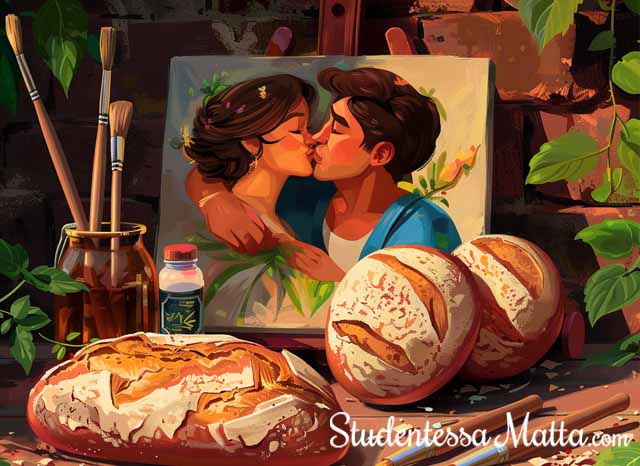





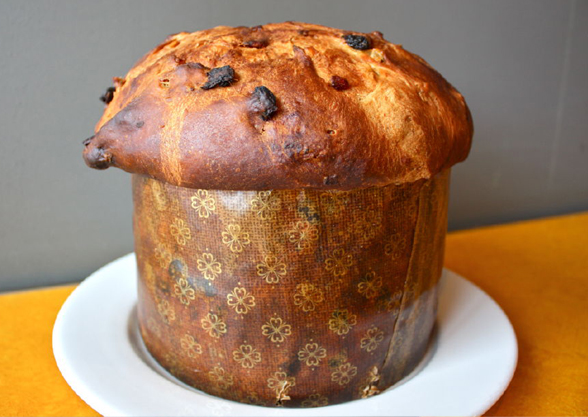





Ciao Melissa, mi piacciono molto questi blog posts! Grazie e brava!!!